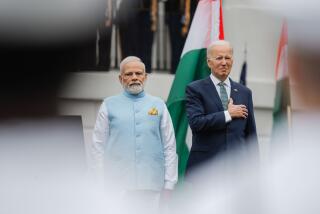Consider Putting Pakistan on the Next Itinerary
- Share via
High-profile U.S. presidential visits to fledgling Third World countries are big business. They can legitimize governments, good and bad; they can reduce tensions in warring regions; they can boost economic prospects by infusing large-scale U.S. financial stimulus packages into wrecked economies.
On Tuesday, the White House announced that President Clinton will celebrate South Asia’s troubled democratic experiments and budding successes in capitalism by visiting India and Bangladesh in late March. Notably, Pakistan has not yet been included on the itinerary.
Should it be? Yes, but not yet. Pakistan’s checkered democracy has been disrupted repeatedly by military rulers unwilling and unable to reform the country’s corroded feudal culture. Its economy is wholly reliant on Western largess, and its porous borders are an invitation to extremist groups from around the world to run drugs, trade arms and breed terrorism. It is unclear whether the current military regime can or wants to reverse any of these dangerous trends.
Yet Pakistan, the Islamic world’s only nuclear power, has been a staunch U.S. friend and ally. And the United States rarely turns its back on a friend, especially one in trouble.
India, the former Soviet Cold War satellite, sports the world’s largest democracy with 200 million middle-class consumers lining up to buy from bulging American inventories. It is buttressed by a vibrant high-technology sector already capable of exporting billions in its brainy software to the world.
Yet India also has wrecked the Clinton administration’s nonproliferation policies with its provocative missile and nuclear weapons tests, sparking a South Asian arms race. It portrays itself, unrealistically, as an emerging world power at less than $400 per person in gross national product. And its virtual enslavement and human rights violations of Muslim Kashmiris clamoring for greater autonomy have created a dangerous culture of perpetual conflict with neighboring Pakistan. Kashmir’s troubles belie India’s claim as Asia’s great experiment in self rule.
By agreeing to go to India, President Clinton has effectively put U.S. economic interests above regional peace and security. This said, he should use his visit there to remind India’s rulers that true democracy must be for all the people in a society, regardless of religious orientation. He should point out that being a regional power also means being a good neighbor. India does not enjoy good relations with a single one of its bordering countries.
He should emphasize that economic revitalization is achievable only in a peaceful atmosphere, and this means finding a long-term solution to the Kashmir dispute with Pakistan. He should encourage India’s prime minister to accept Pakistan’s invitation to talk, because lasting peace with Islamabad inevitably will need the agreement of its military and intelligence establishments.
The president’s privately expressed desire to stop in Islamabad reflects his instinctive loyalty to Washington’s friends. Yet he must carefully weigh the consequences of going to Islamabad now to lecture Pakistan’s generals on democracy, nuclear restraint and terrorism, which will surely inflame already heightened sensitivities about U.S. interference in Pakistan’s internal affairs. An embarrassingly short refueling stop at a heavily guarded military airstrip would undermine Pakistan’s dignity as a nation and be counterproductive for the reforms now underway.
Rather, Clinton should announce before he leaves that he will consider going to Pakistan later this year, once the reform process has yielded tangible results, such as completed local elections (if not a full return to civilian rule), a restructured economy and joint U.S.-Pakistan progress on containing extremist elements operating inside the country.
The president should tell the American people that, far from being a state sponsor of terrorism, Pakistan is a friend coping with very real problems caused in large part by the abrupt withdrawal of the United States and its imposition of unilateral economic and military sanctions, which Clinton has worked successfully to reduce. He should send a strong message that the United States will stand by Pakistan financially by ensuring that International Monetary Fund support continues, as it has done since the October 1999 coup, but that it cannot do more until civil society is restored.
Pakistan should let go of its “me too” syndrome, in which it wants everything on equal footing with India. This policy lacks vision and understanding of today’s world. Islamabad’s generals should concentrate on cleaning up the mess their country has become before inviting guests to come in and have a look. When they have, the president should take the full arsenal of U.S. engagement tools and spend a week there.
More to Read
Sign up for Essential California
The most important California stories and recommendations in your inbox every morning.
You may occasionally receive promotional content from the Los Angeles Times.













